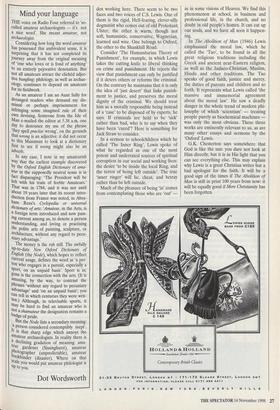Mind your language
THE voice on Radio Four referred to 'so- called amateur archaeologists — it's not a nice word'. She meant amateur, not archaeologist.
Considering how long the word amateur has possessed this ambivalent sense, it is surprising that it has not completed its Journey away from the original meaning of 'one who loves or is fond of anything' to an entirely pejorative denotation. But not all amateurs attract the cliched adjec- tive bungling; philology, as well as archae- ology, continues to depend on amateurs for its fieldwork.
As an amateur I am an Aunt Sally for deranged readers who demand my dis- missal or perhaps imprisonment for infringing some imagined rule of their own devising. Someone from the Isle of Man e-mailed the editor at 5.38 a.m. one day to denounce my use of the phrase they spell practise wrong', on the grounds that wrong is an adjective; it did not occur to this Manxman to look at a dictionary first to see if wrong might also be an adverb.
In any case, I note in my amateurish way that the earliest example discovered by the Oxford English Dictionary of ama- teur in the supposedly neutral sense is in fact disparaging: The President will be left with his train of feeble Amateurs.' That was in 1784, and it was not until about 19 years later that its recent intro- duction from France was noted, in Abra- ham Rees's Cyclopedia or universal dictionary of arts: 'Amateur, in the Arts, is a foreign term introduced and now pass- ing current among us, to denote a person understanding, and loving or practising the polite arts of painting, sculpture, or architecture, without any regard to pecu- niary advantage.' The money is the rub still. The awfully up-to-date New Oxford Dictionary of English (the Node), which hopes to reflect current usage, defines the word as 'a per- son who engages in a pursuit, especially a sport, on an unpaid basis'. Sport is in; gone is the connection with the arts. (It is amusing, by the way, to contrast the Phrases 'without any regard to pecuniary advantage' and 'on an unpaid basis'; you can tell in which centuries they were writ- ten.) Although, in televisable sports, it may be hard to find an amateur who is not a shamateur the designation remains a badge of pride. But the Node lists a secondary meaning: a person considered contemptibly inept'. It is that sharp edge which annoys the amateur archaeologists. In reality there is a declining gradation of meaning: ama- teur gardener (Sissinghurst), amateur photographer (unpredictable), amateur bookbinder (disaster). Where on that scale you would put amateur philologist is up to you.
Dot Wordsworth


















































































 Previous page
Previous page